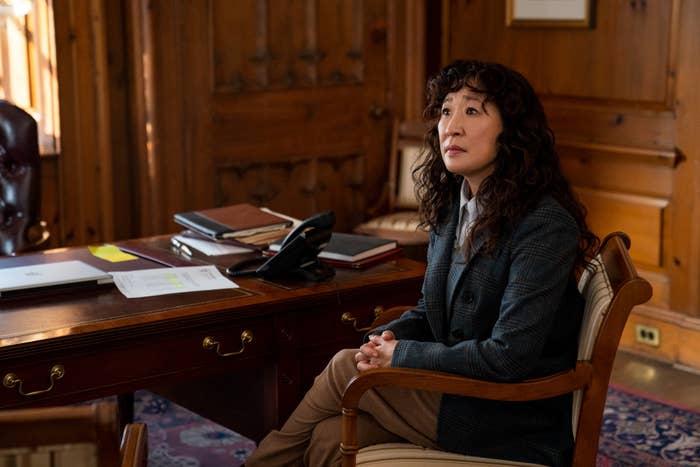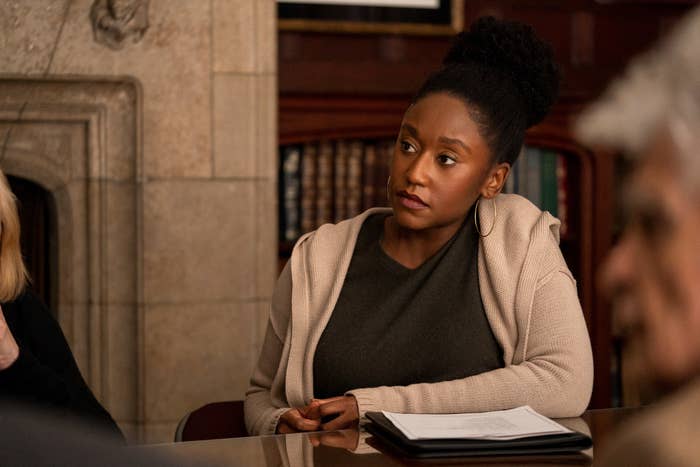
“I feel like I arrived at the party after the last call,” says Ji-Yoon Kim, Sandra Oh’s embattled character in Netflix’s new, compelling six-episode drama The Chair. She’s referring to the timing of becoming chair of an English department at a fictional “lesser Ivy” when the academy and humanities are besieged by budget crises. And when, at least in this telling, tenured professors are at the mercy of empowered and misguided student mobs.
Her frustration is one of many moments when the show calls attention to the phenomenon of women once kept out of power being given a shot once institutions are already in crisis. And The Chair, created by Amanda Peet and Annie Julia Wyman, is an often amusing look at what happens when an Asian American professor ascends to the weirdly powerless authority of department chair. Basically, not much changes.
The series is a great Sandra Oh vehicle and workplace dramedy, as she’s alternately annoyed by and attracted to her colleague Bill Dobson (Jay Duplass), a hapless white guy novelist who becomes the object of a campus backlash. The show chronicles the unfolding of Bill’s scandal, and the department’s fortunes, in zippy, bite-size episodes with some great ancillary characters.
The show’s rich and brief style is one that more streaming shows could benefit from emulating. But its attempt to engage with contemporary cultural mores, already bringing the show acclaim as a biting new satire, is paradoxically the least interesting throughline. Though seemingly nuanced about so-called cancel culture, the show is less a skewering of power than an exercise in sympathy for those already at the top.

Amid pop culture’s facile celebrations of “girlbossing” and white women’s empowerment, The Chair is something of a change of pace. The impossible demands placed on Ji-Yoon — and the show’s portrait of the ineffectuality of attempting to change systems — make for a promising premise.
Ji-Yoon is trying to hold her department together, even as the administration has asked her to get rid of old-school white English scholars whose enrollments are down. At the same time, she’s helping Yaz McKay (Nana Mensah), her Black colleague, get through her tenure review despite the preponderance of white men in her department.
The Chair’s smart writing highlights how the requirements Ji-Yoon must fulfill make it difficult to effect any change. Yaz’s rise is being hindered both by the dinosaurs in her field, but also by donor requests for wider cultural engagement. (Which leads to a funny celebrity cameo that I won’t spoil.)
The show is adept, too, in its puncturing of easy targets, like the pomposity of the tenured professors clinging to relevance. It mocks a persnickety old schooler’s status obsession when he complains about how his graduation gown has been rendered oblong (and thus might be mistaken for a master’s degree gown). In another scene, an older white feminist professor (Holland Taylor) tries to make a complaint about her pay disparity only to find that budget shrinkage means the Title IX office and complaints office have been collapsed into one.
The show implicitly asks viewers to sympathize with the problems of the academic 1% at a moment when the most vulnerable people in academia are graduate students.
The plot really takes off, though, when a recently widowed rock star–ish novelist Bill Dobson, the previous department chair whom Ji-Yoon has feelings for, (spoiler alert) goes viral for doing a mocking Hitler salute in a class about absurdism. Students demand that he resign for being “a Nazi.” And suddenly Ji-Yoon’s duties include babysitting Bill through his scandal because he refuses to apologize.
The subplot is seemingly a commentary on the ways that women end up having to clean up men’s messes. But the brouhaha with Bill — which is the moral center of the show — never quite makes sense. The idea that a white novelist would get falsely accused of antisemitism is neither compellingly realistic — in the way that the budget crisis is — nor outrageously parodic.
In one scene where Bill tries to engage his critics and explain himself, the students aren’t clear about what they’re asking for. In fact, we never see things from the student perspective; they are depicted as completely clueless or as decontextualized idealists rightly protesting the defunding of ethnic studies.
It’s probably too much to ask a Netflix series to complicate pop-cultural understandings of power in the era of corporate diversity politics. But the show’s major plot engine only makes sense if you think of it almost like a capitulation to cancel culture critics who think white men are being forced to apologize for things they didn’t do. (It also suggests the show didn’t want to really go there in terms of depicting who actually gets subjected to weaponized accusations of antisemitism: Palestinian scholars critiquing US imperialism.)
It’s frustrating, too, that the show implicitly asks viewers to sympathize with the problems of the academic 1% at a moment when the biggest crisis in academia is mass adjunctification and the most vulnerable people in academia are graduate students.
Bill’s TA, Lila (Mallory Low), who is also something of a mentee to Ji-Yoon, gets caught up in the melee when a student reporter asks for her opinion and Ji-Yoon asks her not to comment. Both Ji-Yoon and Bill overlook Lila’s complicated predicament, and we don’t really get to see things from her perspective.
In one scene where the department brings in a PR person to stop the damage, an administrator questions Ji-Yoon’s “professionalism” in telling the TA not to comment given her relationship with Bill. But the scene gets played as a “Would you ask a man that?” sympathetic female empowerment scenario. In the end, Lila smiles when she sees Bill’s note in support of her dissertation. The writers would have done well to talk to current graduate students to gauge their actual feelings about academic labor politics. (Hint: No matter who is in charge, all are being exploited.)
It’s not as if the show couldn’t more outrageously lean into the humor and power plays involved in what goes on at the top. The way the white feminist professor ends up elevated amid a coup suggests the writers understand the Survivor-style jockeying that can characterize multicultural academia. The show juggles enough that a second season could maybe expand on certain things that get sidelined here; not just the TA’s perspective, but Ji-Yoon’s and Yaz’s different investments in the possibilities of institutions could be further teased out.
The Chair is a fun, bingeable workplace dramedy. But that it’s being hailed as satire says more about the overlapping class politics of the media and tenured faculty as culture industry workers than about its “biting” politics.●
Correction:
The character Bill Dobson's last name was misstated in a previous version of this post.
